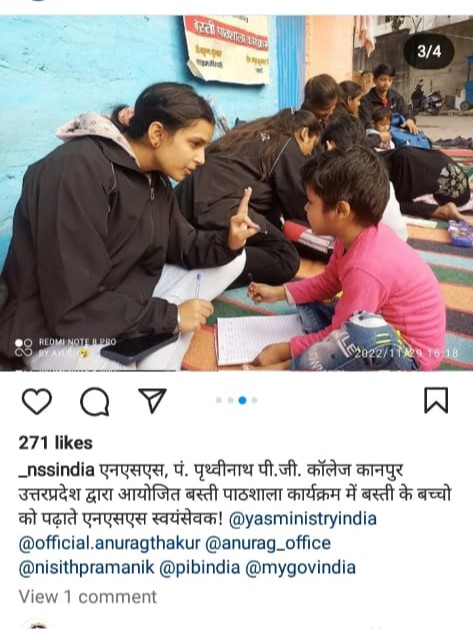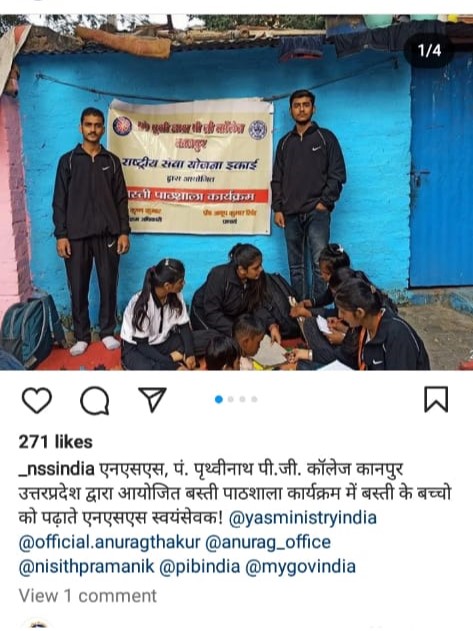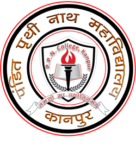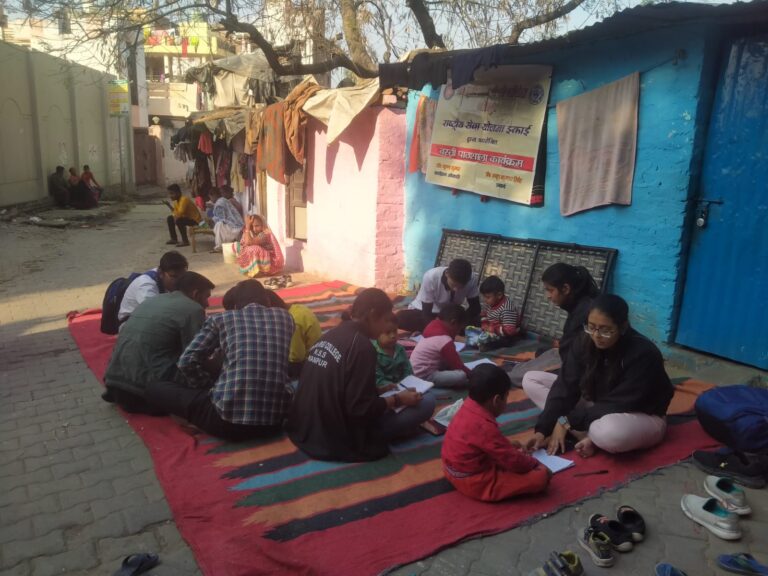
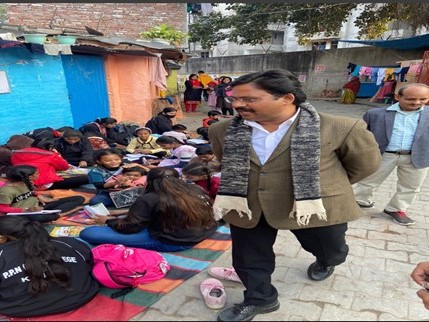
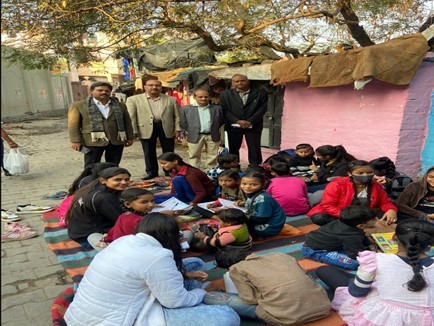
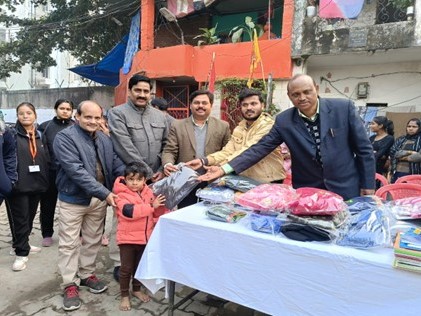
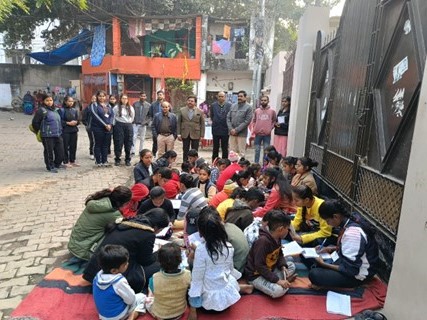
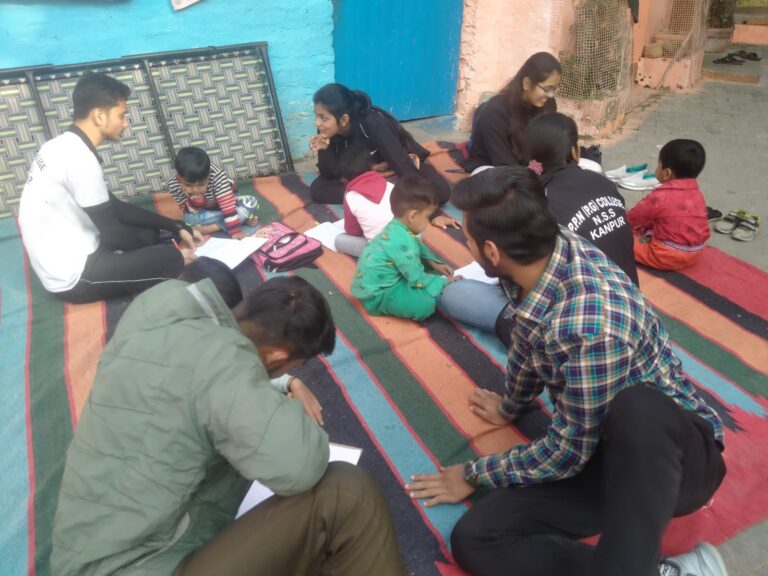
Basti Pathshala
Objectives of the Practice:
- Education Accessibility: The main goal of the Basti Pathshala initiative is to give children of Gwaltoli Ward 4 slums regular, accessible basic education. Some other goals are as follow…..
- Community Involvement and Issue Sharing: The project seeks to establish an interactive forum where inhabitants can feel at ease discussing issues that are important.
- Holistic Development: The effort places a strong emphasis on the children’s overall development in addition to their academic education.
- Inclusive Support and Participation: Through the provision of funding for necessary supplies, it guarantees the involvement and endorsement of parents and kids in the Basti Pathshala initiative.
- Community Empowerment and Vibrancy: The campaign aims to infuse slums with vitality through activities like the Yoga Day program. By planning events with a strong community focus, it hopes to empower locals and highlight the good things about their neighbourhood, enhancing the general sense of pride and well-being among the populace.
The Context:
Basti Pathshala was started in the after considerable thought was given to the difficult problems and contextual elements that were present in the neighborhood. The population of Gwaltoli, particularly the youngsters, faced considerable challenges due to the economic inequality and restricted educational opportunities. Because children in this community were not able to attend official schooling because of various socioeconomic circumstances, there was an urgent need for an alternate type of education.
In order to tackle these problems, the NSS unit launched an interactive drive with the assistance of the program officer, Prof. Krishna Kumar, and the respected principle, Prof. Anoop Kumar Singh. The objective was to establish a welcoming environment where inhabitants could confide in one another and develop a feeling of community engagement and trust.
The initiative deliberately incorporated cultural and recreational activities, against the backdrop of these contextual challenges to strengthen the community and infuse the slums with good energy.
The Practice:
Under the inspirational direction of Principal Prof. Anoop Kumar Singh and Program Officer Prof. Krishna Kumar, the NSS unit is spearheading the Basti Pathshala program. This method deviates from conventional educational norms and adopts a holistic, community-driven approach to address the complex issues faced by underprivileged groups. It began on October 14, 2022, in the Gwaltoli.
The goal of Basti Pathshala is to close the educational gap for kids who can’t attend regular schools because of financial limitations. Residents can voice their concerns in a secure area thanks to the interactive drives started by NSS volunteers, which promotes a sense of community ownership and cooperation. This distinct aspect acknowledges that education is a collaborative effort rather than an isolated undertaking.
The project skilfully incorporates recreational and cultural components into its overall design. In addition to encouraging physical well-being, Yoga Day is celebrated on June 21. It also acts as a cultural bridge, boosting communal liveliness and fostering a sense of identity and pride. With these extra aspects, Basti Pathshala becomes more than just an educational intervention; it becomes a catalyst for the growth of the community.
The practice actively involves parents in the educational process as part of its commitment to inclusivity, which goes beyond the kids. Acknowledging the importance of parental support, the program guarantees participation and permission, promoting a cooperative atmosphere. In addition to helping the kids succeed academically, this family involvement builds a bridge between the community and the school and encourages a lifelong dedication to learning.
But there are certain limitations and difficulties along the way. The community’s financial constraints make it difficult to guarantee a steady supply of educational resources. The program sets aside money to combat this, but it’s yet unclear how long-term this financial support will last. Working together with neighborhood companies or governmental organizations may open up financial assistance options, strengthening the initiative’s viability.
Basti Pathshala is a unique effort that serves as both a catalyst for community empowerment and an educational program. This strategy redefines the role of higher education in elevating marginalized people by embracing the problems inherent in the community, increasing familial involvement, and integrating education with cultural festivals. Basti Pathshala, an example of transformational education, is a project that has the power to change the perception of higher education’s contribution to social progress.
Evidence of Success:
Since its launch, on October 14, 2022, the Basti Pathshala is demonstrating its effectiveness in closing educational disparities and promoting community development. The regular enrollment and involvement of kids in Basti Pathshala is a crucial sign of success. The initiative exceeded its ambition of including 70 to 75 children in its educational activities, in addition to meeting its original goal. The children’s consistent daily attendance shows that the program can overcome possible obstacles like budgetary and infrastructure limits to establish a welcoming and stimulating learning environment. Moreover, the community’s positive feedback demonstrates the initiative’s commitment to holistic development.
Financial limitations, which were a big obstacle at first, have been lessened thanks to the NSS unit’s funding allotment and effective fundraising campaigns. In addition to sustaining Basti Pathshala’s ongoing operations, this financial stability has made it possible to provide the necessary supplies, such as books and stationery, to create an environment that is favourable for the kids to learn in.
In conclusion, there is ample and diverse proof of Basti Pathshala’s effectiveness. It is demonstrated not just by reaching and surpassing enrollment goals but also by the kids’ academic advancement, the initiative’s continued existence, good community comments, and stable finances. All these findings point to a revolutionary influence on the educational environment in the Gwaltoli Ward 4 slums, demonstrating the capacity of community-led projects to effect long-lasting, beneficial change.
Problems Encountered and Resource Required:
- Economic Constraints: The community’s economic volatility presented difficulties for the Basti Pathshala effort. Financial hardships faced by families impeded their ability to get essential school materials like books and stationery. In order to combat this, the NSS unit’s strategic resource allocation became crucial, guaranteeing the kids’ ongoing access to materials.
- Family Conditions: Priorities for schooling and family dynamics were directly impacted by economic hardships. Constant efforts were needed to persuade parents of the long-term advantages of schooling. By actively incorporating parents in the educational process, encouraging a collaborative approach to learning, and coordinating educational goals with family circumstances, the project addressed this difficulty.
- Gender Bias: Pervasive throughout Indian society, gender bias has complicated the educational system. Male children’s education was occasionally given priority over female children’s education due to societal standards. The program made sure that there was an equal and inclusive learning environment to counter this. Sensitization sessions were included to dispel gender norms and advance universal access to schooling.
In navigating the complex socio-economic landscape of Indian society, the Basti Pathshala initiative employed a multi-dimensional approach, addressing economic, familial, and gender-related challenges. This comprehensive strategy not only aimed to provide education but also sought to catalyze societal change, creating a more inclusive and equitable educational landscape within the community.
Required Resources:
To effectively serve the various needs of the community, the Basti Pathshala program needs a combination of material, financial, and human resources. The following are essential resources for the initiative:
- Education Materials:
- Financial Resources:
- Human Resources:
- Community Support:
- Awareness and Sensitization Programs:
- Monitoring and Evaluation Tools:
- Cultural and Recreational Resources:
- Networking and Collaboration:
- Advocacy and Recognition:
By guaranteeing the accessibility of these materials, Basti Pathshala can function efficiently, deal with issues, and make a long-lasting difference in the community it serves in terms of education.
Notes:
Institutions should consider the Basti Pathshala initiative’s significant effects beyond basic education before implementing it. Highlight how the program helps children acquire a sense of social responsibility, breaks down socioeconomic barriers, and builds community. It is imperative to actively involve parents, foster trust, and engage the local community through honest communication to successfully adopt this best practice. Establishments must set aside money for necessary supplies and plan recurring activities to support the recreational and cultural components of education. In addition, maintaining success requires cultivating a long-term commitment from volunteers and stakeholders. Through the incorporation of these ideals, educational institutions can serve underprivileged communities and facilitate a comprehensive transition that embodies the values of social inclusion and community upliftment.
